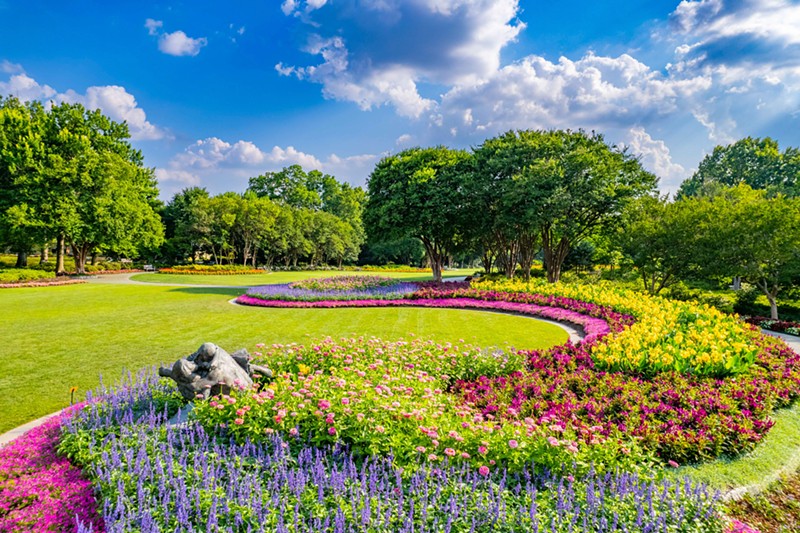One former employee, David Jeffcoat, alleged that after seven years of working at the arboretum (including a then-recent promotion), he started receiving poor treatment, a more rigorous work schedule and tasks that he claimed were impossible to complete within the timeframes he was given.
Four months later, Jeffcoat was fired. The reason cited for his firing was that Jeffcoat failed to perform daily tasks but given the timeline of events. Jeffcoat believed this to be pretextual.
Another complaint involves a former employee who is nonbinary, referred to by Lambda Legal as Jay Doe, who was in a managerial position. After including their pronouns on their badge and email signature (and supporting others who did the same), Doe was allegedly told that the arboretum is a conservative institution and shouldn’t “support an agenda.”
They were also reportedly told that a donor had seen their pin and threatened to pull funding. At that moment, Jay Doe became visibly upset, according to a statement.
“I shared with them my struggles, my feelings, and how these changes were like asking me to go back in the closet, " Doe wrote in a statement for Lambda Legal. “Never had I been so honest and vulnerable in a workplace before.”
They also wrote that they were handed their termination letter the next day.
After news of the complaints got out, protests broke out outside of the arboretum’s gates with activists and allies calling for change. Some people inside were listening.
“The recent claims have caused the organization to take steps over the past months to examine and improve its policies, procedures, practices and culture so that the organization can undergo institutional change and ensure that all of its constituents are heard and welcome,” arboretum board chairman Jim Ryan wrote in a 2022 response letter.
The changes to the employee manual, including allowing pronouns in email signatures, were made quickly. Employees also received additional training on creating a respectful work environment, and the board adopted a policy for diversion inclusion.
Rooting for Diversity
Last November, the arboretum hired a new CEO, Sabina Carr, who formerly headed the San Antonio Botanical Garden. While the Dallas arboretum had begun to deal with the culture that prompted the allegations, Carr knew when she took the job that the work had just begun.“Any new CEO walking in inherits the culture [the old CEO] created,” Carr tells the Observer. “I knew this was not a maintenance job. I knew I could still build here and that there was another legacy that could be left.”
Carr had previously tackled diversity in her industry as board president of the National Association of Public Gardens. During her time in San Antonio, she was part of a cohort of botanical gardens that create diversity initiatives, a program she’s applied for Dallas to join.
She believes that systems that limit diversity and inclusivity are counterintuitive to her line of work.
“I’m always inspired by plants, the most diverse kingdom on Earth,” she says. “They play off each other and benefit from each other. ... Why don’t we take a cue from them?”
Carr says that while previous arboretum leadership had built and managed a beautiful garden, they had also created a “wounded culture.”
“Any new person that comes on board knows that it’s going to take a while to turn that around,” she says. “I want our culture to be positive and innovative and respectful.”
One of Carr’s first moves as CEO was to create a strategic plan, a process through which an organization comes up with clearly defined goals. Carr says this hadn’t been done in a meaningful way in over 10 years.
What administrators came up with was a five-year plan to implement more IDEA (inclusivity, diversity, equity and accessibility) policies that would make the arboretum “one of the best places to work in Dallas.”
Part of this plan involved overhauling the human resources department, which is now called People and Culture.
“We hired an accredited HR professional,” she says. “She started about two months ago and she’s already made a world of difference. ... It’s a process. You don’t check a box on diversity and inclusion. It’s ongoing. It changes. All you can do is adapt and be flexible.”
Carr had not heard the claim that employees had been instructed not to share their pronouns over donor complaints, but does say that pushback from older generations would not deter her mission.
“We’re encouraging our team to be themselves,” she says. “The handbook was changed before I got here to be more inclusive of what makes you unique and an individual — that’s a few piercings, or your hair or the way you dress, we’re opening that door a little bit more. If there’s a more mature generation of donors that doesn’t agree, I don’t know what to say about that except that it’s 2024.”
As to the question of whether the arboretum is now a safe work environment for LGBTQ employees, Carr had only three words to say:
“I hope so.”
Two complaints against the arboretum are still active. Neither Carr nor representatives for Lambda Legal would provide details on the status of these cases.













